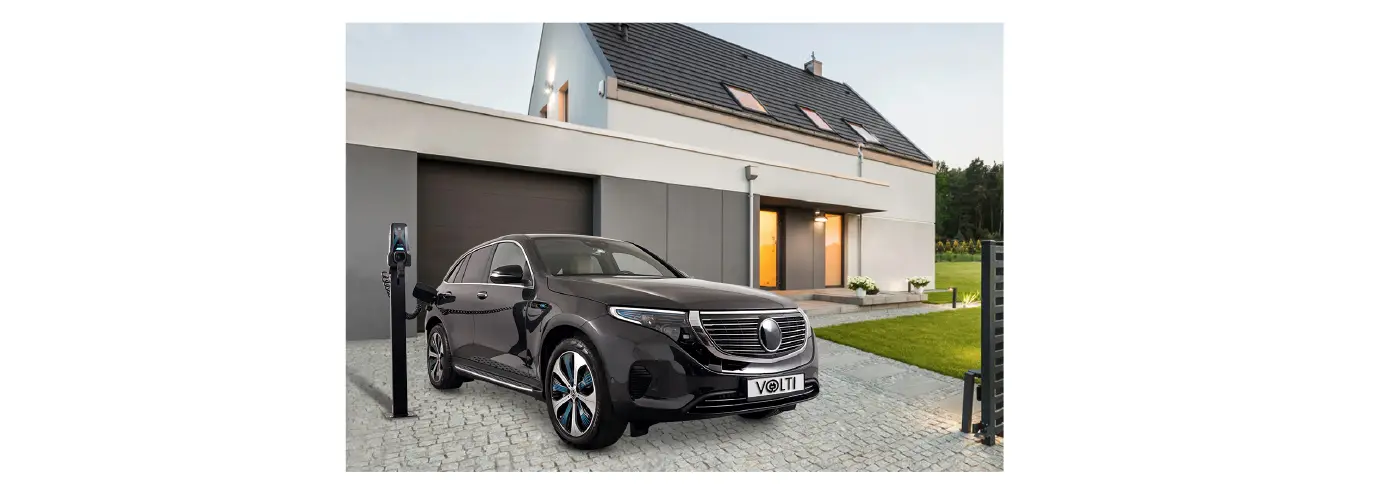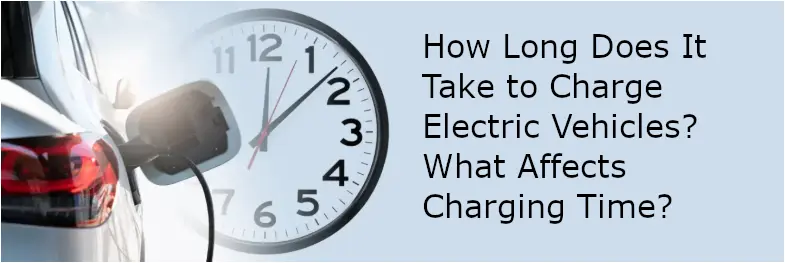How Long Does It Take to Charge Electric Vehicles? What Affects Charging Time?
For electric vehicle (EV) owners, charging time is undoubtedly one of the most contemplated topics. Although fast-charging technologies have made a great leap in recent years, satisfaction surveys tell us this: Long charging times continue to be one of the biggest obstacles limiting the free movement capability of electric vehicles.
So, if you’re asking, “How many hours does it take to charge electric vehicles?” don’t expect an immediate, single answer; because this question has no one-size-fits-all response.
Charging time varies depending on a host of factors, from the battery’s capacity and the charger’s power to the electrical infrastructure, the vehicle’s own charging limits, and even the battery’s current state of charge. Typically, charging a standard electric vehicle with a 60 kWh battery from empty to full at home using a 7 kW charging station takes about 9 hours.
Nevertheless, although it varies depending on the charging method, battery size, and infrastructure, we can summarize the average charging times and driver expectations with today’s technology as follows:
-
Home AC Charging: 6-12 hours (a patient wait for a full charge).
-
Public AC Charging: 4-8 hours (full charge, practical for daily errands).
-
Fast DC Charging: 20-40 minutes (from 20% to 80%, a favorite among travelers).
-
Super Fast DC Charging: 15-20 minutes (from 20% to 80%, practically at the speed of light).

6 Key Factors Affecting Electric Vehicle Charging Time
Your electric vehicle’s charging time takes shape like a puzzle, with different pieces coming together. So, what are these pieces? Let’s explore the fundamental factors that determine charging time, step by step.
1- Battery Capacity: How Big Is Your Tank?
Electric vehicle batteries are measured in a unit called kilowatt-hours (kWh). A small battery, say a 40 kWh one, fills up quickly. But when it comes to a large 100 kWh battery, a bit more patience is required for a full charge. It’s just like the difference between filling a glass of water and filling a large water cooler jug.
2- Charger Power: Are You Going Fast or Slow?
The charger is the hero that determines how fast energy can be pumped into your battery. There are three different levels; let’s look at them one by one:
-
Level 1 (AC, 2.3-3.7 kW): Ideal for portable charging cables plugged into a standard household socket. Easy to carry in the trunk, but a full charge can take 10-30 hours. Great for emergencies, but not if you’re in a hurry.
-
Level 2 (AC, 7.4-22 kW): Wall-mounted units at home or public charging points. Provides a full charge in 4-8 hours for an average battery. An option that fits the pace of daily life.
-
Level 3 (DC, 50-350 kW): The star of fast charging stations! With 50 kW, you can reach 80% charge in 30-60 minutes, and with 150-350 kW, you can reach the same level in 15-30 minutes. A true savior on long journeys.
3- Electrical Infrastructure: How Ready Is Your Home?
Charging time also depends on the capacity of your home’s electrical system. Are you using a single-phase connection? Then charging at 3.7-7.4 kW might take a bit longer. If you have a three-phase system, things speed up with 11-22 kW. Remember, power outages and voltage fluctuations are also part of this story.

4- Vehicle Charging Capacity: How Fast Can Your Vehicle Charge?
Every electric vehicle has an “On-Board Charger” (OBC). This small controller decides how fast energy from the charging station can be delivered to the battery. For example, if your vehicle’s OBC is limited to 50 kW, you won’t be able to draw more even if you connect to a 150 kW super-fast station. Checking this detail when buying a car is important to avoid surprises later.
5- Starting Charge Level: How Empty Is Your Battery?
The charge flows at its fastest rate when your battery is between 20% and 80%. However, if it’s completely drained—what we call a “deep discharge”—the charging starts slowly for safety reasons and speeds up after reaching a certain level. Once it passes 80%, the speed decreases because the battery enters a “topping off” charge mode. So, it’s useful to plan your charging around the battery’s state of charge.
6- Environmental Conditions: Is Weather Also a Factor?
Yes, even air temperature can affect charging time. On cold days, the battery’s internal resistance increases, which can prolong the charging process slightly. In extreme heat, safety systems kick in and reduce the speed. Fortunately, some vehicles have heating/cooling systems that keep the battery at an ideal temperature. This ensures efficient charging and keeps the battery effective.
How Long Do Electric Vehicles Take to Charge?
The charging time for electric vehicles is truly the result of a team effort. The electrical grid, transformer, infrastructure of the charging point, the station itself, the charging socket, the on-board charger (OBC) inside your vehicle, and of course the battery… All these team members come together to determine the answer to the question, “What will the charging time be?”
But don’t worry, calculating this time is much easier than you think! With a practical solution like a charging time calculator, you can quickly figure it out. With such a tool, you can enter a few simple pieces of information and get the result instantly. Now, let’s explain step by step how you can do a similar calculation yourself.
What Do You Need to Know to Calculate?
There are a few key pieces of information you need to have on hand to find the charging time:
-
Battery Capacity: How big is your vehicle’s energy storage? You can get this detail from the manual or the manufacturer.
-
Your Vehicle’s OBC Capacity: In other words, your on-board charger’s AC and DC charging limits. You can easily learn this from your vehicle’s user manual or the manufacturer.
-
Charging Station Power: If you want to know the energy provided by the charging station you’ve connected your vehicle to, just look at the label on the device.
Use a Simple Formula to Figure It Out!
The math for calculating charging time is very simple. Here is a handy formula for you:
Charging Time (hours) = Battery Capacity (kWh) ÷ Charging Power (kW)
We follow a simple path to calculate the charging time; first, we clarify the Charging Power. Whichever is smaller between the Charging Station Power and the On-Board Charger Power, that is your Effective Charging Power. For example, if the station can provide 22 kW but your OBC is limited to 7.4 kW, your charge will proceed at 7.4 kW.
Then, divide your Battery Capacity by the Charging Power, and there you have the approximate charging time! Let’s say your battery is 50 kWh and your charging power is 7.4 kW; in this case, your approximate charging time is 50 ÷ 7.4 ≈ 6-7 hours.
Charging Times by Charger Type and Power
Your electric car’s charging time can vary dramatically depending on the type and power of the charger you use. We have compiled these times for you in the table below, but remember: details like battery capacity, your vehicle model, and charging infrastructure can alter these figures slightly. So, use this information as a guide and adjust it according to your own situation.
| Charging Type | Power | Avarage Charging Time |
|---|---|---|
| Portable AC Charging | 2.3 kW | 20-25 Hours |
| Home Type AC Charging | 7.4-22 kW | 2-8 Hours |
| Fast DC Charging | 50 kW | 30-60 Minutes |
| Ultra Fast DC Charging | 150-350 kW | 15-30 Minutes |
Note: Charging times are average values for vehicles with a 50 kWh battery and a 22 kW on-board charger.
Portable AC Chargers (2-3 kW): They Require Patience
Portable AC chargers stand out with their low power. For instance, if you want to fully charge a 50 kWh battery, you’ll need around 20-25 hours. Yes, it’s a bit long, but these devices are real lifesavers! In places without charging infrastructure, you can carry one in your trunk and plug it into any socket to get the job done. They are perfect for emergencies, so it makes sense to keep one in the car.
Home Type AC Chargers (7-22 kW): The Friend of Daily Life
This is the most common and budget-friendly option for those who want to charge at home or the workplace. With these chargers, which have a power of 7.4-22 kW, you can fully charge a 50 kWh battery in 2-8 hours. Ideal for those who want to plug in at night and wake up to a ready car. It’s both a practical and economical solution.
However, for those who may not know, it’s worth mentioning: Stations with 22 kW power require a three-phase electrical installation. Therefore, it’s useful to check if your home or workplace’s electrical infrastructure is suitable for this.
Fast DC Charging (50 kW) and Ultra-Fast DC Charging (150-350 kW): The Heroes of the Journey
For those who want to save time on long journeys, fast DC charging stations come into play. With 50 kW, most of your battery charges in 30-60 minutes, and with 150-350 kW ultra-fast charging, this time drops to just 15-30 minutes. Sounds great to charge your car while taking a coffee break and then continue your journey, right?
But a small warning: Ultra-fast charging can put a bit of strain on battery health in the long term. So, it’s beneficial to prefer this not for every charge, but for more urgent situations or long travels.

How Many Hours Does It Take to Charge Electric Cars at Home?
Charging your electric vehicle at home is both a practical solution and one that fits the pace of daily life. So, how does it work at home, and how long does it take? Let’s look at the details together.
Home Type AC Chargers (7-22 kW): Ready Overnight
If you have installed a 7 kW or 11 kW home AC charging unit at your home, your vehicle charges fully in 4-8 hours. With a 22 kW unit that can operate with a three-phase electrical installation, this time can drop to 2-4 hours.
It’s a great option, especially for those who want to charge overnight. You plug it in in the evening, and when you wake up in the morning, your car is ready for the road! You might need an electrician for the installation, and the cost for this ranges between 10,000 – 15,000 TL. While it involves some initial expense, it provides convenience in the long run.
Standard Socket or Portable AC Charging (3 kW): Slow But Steady
Some electric vehicles can be charged from a standard household socket (3 kW). You can also use a portable AC charger if you wish. However, the pace is a bit slower here; you might need to wait 12-24 hours for a full charge. It’s ideal if you’re not in a hurry or just need it to “get by.” However, for long-term use, it’s good to be careful to prevent the socket and cables from overheating. Safety always comes first, right?
Home charging is both wallet-friendly and easy to plan. If it were you, would you charge overnight, or take it slow with a standard socket? The choice is yours

Average Charging Times by Electric Vehicle Model
If you’re curious about how popular electric vehicle models sold in Turkey perform when we talk about charging times, you’re in the right place! Below, we have updated a table for you that includes the battery capacities and charging times with different power levels (7.4 kW, 22 kW AC, and DC fast charging) for some beloved electric vehicles available in the Turkish market.
This table will give you an idea of what to expect, although times may vary slightly due to factors such as the vehicle’s on-board charger (OBC) capacity, the actual power of the charging station, and environmental influences. Additionally, some models may not support high-power AC charging; therefore, it will be worthwhile to check your vehicle’s technical specifications.
| Vehicle Model | Battery Capacity(kWh) | 7.4 kW AC Charging Time | 22 kW AC Charging Time | DC Fast Charging Time (0-80%) |
|---|---|---|---|---|
| TOGG T10X (Standard Range) | 52.4 kWh | ~7 hours | ~2.5 hours | ~12 minutes (180 kW DC)* |
| TOGG T10X (long Range) | 88.5 kWh | ~12 hours | ~4 hours | ~10 minutes (180 kW DC)* |
| BYD ATTO 3 | 60.5 kWh | ~8 hours | ~3 hours | ~35 minutes (DC)* |
| BYD SEAL | 82.5 kWh | ~11 hours | ~3.5 hours | ~35 minutes (DC)* |
| Tesla Model 3 | 60 kWh | ~8 hours | ~3 hours | ~30 minutes |
| Tesla Model Y | 75 kWh | ~10 hours | ~3.5 hours | ~30 minutes |
| Hyundai Kona Electric | 64 kWh | ~8.5 hours | ~3 hours | ~75 minutes |
| Nissan Leaf | 40 kWh | ~5.5 hours | ~2 hours | ~49 minutes |
| Renault Megane E-Tech | 60 kWh | ~8 hours | ~3 hours | ~40 minutes |
Let’s take an in-depth look at our table and evaluate the diversity and performance of models sold in Turkey. The TOGG T10X, as a domestically produced SUV, offers two different battery options: the Standard Range (52.4 kWh) model offers a 314 km range, while the Long Range (88.5 kWh) version can reach up to 523 km. With 180 kW DC charging, the standard range model can charge from 0-80% in 12 minutes, and the long-range model in 10 minutes. These times represent performance compatible with the rapidly spreading DC fast charging stations in Turkey.
BYD models are also noteworthy. The ATTO 3, with its 60.5 kWh battery, offers a 420 km range, while the SEAL, with its 82.5 kWh battery, can reach up to 570 km. Both models can achieve a 0-80% charge in approximately 35 minutes with DC fast charging, although the capacity of charging stations in Turkey, typically 50-120 kW, may slightly extend this time.
There is similar diversity among other models. While the Tesla Model 3 and Model Y stand out with their high ranges and fast charging capabilities, models like the Hyundai Kona, Nissan Leaf, and Renault Megane E-Tech appeal to a broad user base with more accessible prices. However, charging times may vary depending on your vehicle’s OBC capacity, the actual power provided by the station, and environmental conditions.
This information can help you plan your charging strategy, whichever vehicle you choose. Which model’s charging time and range do you think would better suit your daily life in Turkey? Or do you prefer saving time with fast charging on the road? The decision, of course, is yours.
Why Are Electric Vehicle Charging Times So Important?
The charging times of electric vehicles are a detail that truly determines how easily this technology can integrate into our lives and how it shapes our daily experience. Whether the charging time is short or long directly affects your vehicle’s freedom of movement, ease of use, and especially your comfort on long journeys.
While faster charging makes these cars more practical, choosing the right charging technology both extends your battery’s lifespan and maintains the balance of the electrical grid. So, why is this timeframe so critical? Let’s explore this issue together from different angles.



 Türkçe
Türkçe